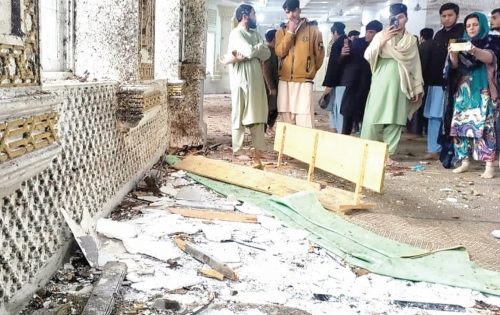Suicide blast at Taliban religious school in Pakistan kills six
AFP | Peshawar
Email : editor@newsofbahrain.com
A suicide attack at an Islamic religious school in Pakistan known as the “University of Jihad” -- where key Taliban leaders have studied -- killed six people yesterday, police said.
Among those who died was Hamid ul Haq Haqqani, the head of the Dar-ul-Uloom Haqqania school, in Akora Khattak, about 60 kilometres (35 miles) east of Peshawar.
“Initial reports suggest the blast occurred after Friday prayers as people were gathering to greet Hamid ul Haq. It appears to be a suicide attack,” Abdul Rasheed, the district police chief, told AFP.
The explosion left six dead including the suicide bomber and 16 injured, three of whom are in a critical condition, Rasheed said, adding that an Afghan national is among the dead.
Rasheed said that Haqqani, the head of a local right-wing Islamist party, appeared to be the target of the bomber.
He was the son of Sami ul Haq Haqqani, who was assassinated in 2018 and known as the “father of the Taliban” for teaching the insurgent group’s founder Mullah Omar at the same religious school.
The explosion happened as people gathered for weekly Friday prayers, the most important day of the week.
Pakistan’s Prime Minister Shehbaz Sharif and interior minister Mohsin Naqvi condemned the incident as a “terrorist” act. The sprawling campus in Pakistan’s Akora Khattak is home to roughly 4,000 students who are fed, clothed and educated for free.
It became known as the “University of Jihad” for its fiery ideology and the number of Taliban fighters it has produced.
Omar, who led an insurgency against the United States and NATO troops in Afghanistan before his death in 2013, graduated from the school along with Jalaluddin Haqqani, the founder of the feared Haqqani network which took its name from the school.
The Haqqani network is responsible for some of the worst attacks in Afghanistan.
Jalaluddin Haqqani was the father of Sirajuddin Haqqani, the current interior minister for the Taliban government in Afghanistan, himself also a graduate of the school.
Abdul Mateen Qani, the spokesman for the interior ministry in Kabul, said the government “strongly condemned the attack” and blamed it on the jihadist Islamic State group.
IS, a rival of the Taliban movement but with which it shares a similar hardline Islamic ideology, has been responsible for several attacks against the Taliban government since it retook power in 2021.
No group has yet claimed the bombing.
Incubators for militancy
The school has sat at the crossroads of regional militant violence for years, educating many Pakistanis and Afghan refugees -- some of whom returned home to wage war against the Russians and Americans or preach jihad.
For decades, Pakistani ‘madrassas’ have served as incubators for militancy, indoctrinating tens of thousands of refugees who have few other options for education than the fiery lectures from hardline clerics.
Rather than crack down on the institutions, successive governments in Islamabad -- which rely on the support of Islamist parties in coalition governments -- have largely given the schools a free hand.
Related Posts

